|
ILLUMINATING PIECE OF THEATRE AT THE PLAYHOUSE
|
|
High expectation is always dangerous in theatre, but the reappearance of Gouthwaite Hall is as entertaining as one had anticipated. Christine and Nevin Ward’s spirited production takes us back into a world of passion, treason and treachery, where words and actions reflect not only the religious factions of a turbulent time but also the complex nature of drama itself. |
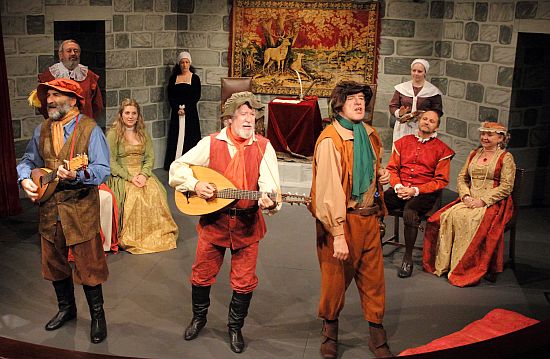 |
| During the Christmas season of 1609 a company of recusant players from Egton, near Whitby, led by Christopher Simpson, a cordwainer, performed a play of St. Christopher from a printed book at Gouthwaite Hall. Other plays in the players’ repertoire included William Shakespeare’s King Lear and Pericles, and the Bard sits comfortably here alongside playwright Ward’s illuminating and dramatic account of this episode in our local history. |
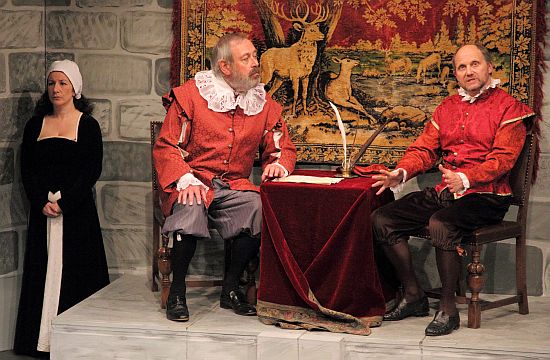 |
| The Hall was owned by Sir John Yorke, a pragmatically conforming member of the Church of England where his wife Juliana was a resolute Catholic. Although the Catholic faith was held to be treasonous at this time many people in England, in the North particularly, still secretly worshipped in the Catholic manner. A hundred of the Yorke family’s friends, tenants and servants crowded into the Hall to watch the play. The actors decided to include an interlude of a dispute between two characters, one Protestant and one Catholic, which ended with the Protestant being dragged to hell and the Catholic going to heaven. A female servant claimed the play was seditious; it was reported to the Justice of the Peace, and the Yorkes were prosecuted for permitting it. A trial eventually took place in the Court of the Star Chamber in London. |
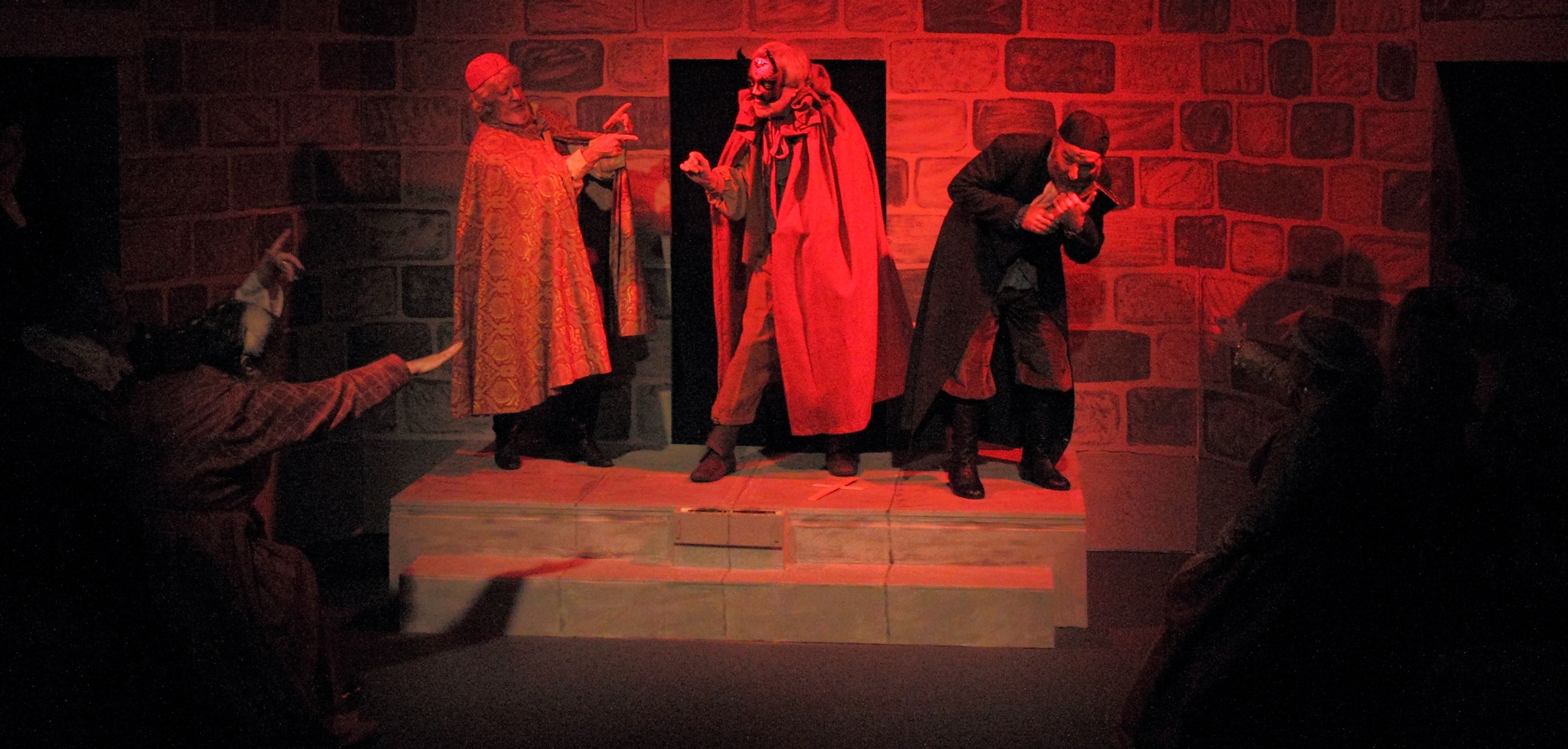 |
|
If Ward seizes on a running theme it is the motif of ‘play's the thing’, for this is a subtle, nuanced drama, a play made up of players playing at playing their parts, with plays within the play, and with the author-actor playing at both acting and being the author of Shakespeare’s plays. You see this from the moment the visiting players arrive. With several quotations and allusions to the works of Shakespeare, the drama is perceptive and knowing, and there is everything the playgoer seeks: ‘tragical-comical-historical-pastoral’. There are swords, daggers, bangs and shocks, and Ward caters for ‘the groundlings’ with relevant Nidderdale references. |
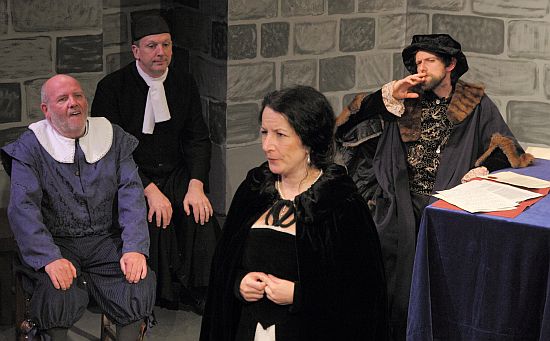 |
|
Despite, however, its often broad comedy the play is far from being humorous. Ward has turned to official accounts of the trial and to witness statements to provide an accurate picture, though with liberal interpretation for dramatic effect. The production acquires a textured atmosphere as it moves to the reaction of the Protestant minister William Stubbs, and to the implications of his involvement with local landowner Sir Stephen Proctor; and it becomes psychologically astute. There is talk of buying influence and flouting the law, but our sympathies lie with the Yorke family whilst their accusers’ religious and legal convictions are overshadowed by their hypocrisy. |
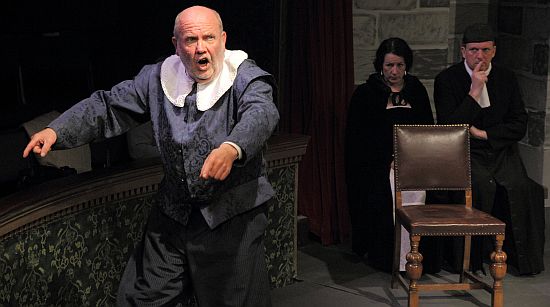 |
|
There is terrific support from the Playhouse Company, not only on stage and behind the scenes but also with a fine set, magnificent costumes, haunting vocals and contemporary music, with the talented playing of Ward himself and of Steve Rouse on rebec, cittern and lute, alongside Heather Appleton’s percussion. Never has the ‘Lyke Wake Dirge’ sounded so pertinent, here used as a means of restoring religion to the spiritual being from the cold hands of the law. |
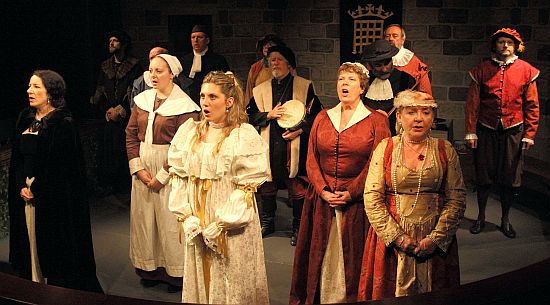 |
|
I particularly admired the clarity and confidence of this production. The actors speak the language well, and it is thrilling to see the audience hang on every word, caught up in the drama before them. Newcomer Charlotte Bain takes on the role of Lady Ann with a wilful and moving intensity. Steve Boast reprises with great good humour both his playful Pant and a terrifying Beelzebub, and Rachel Smith’s marginalised servant Margaret broods with haughty resentment alongside the gentle Joan of Heather Appleton. Colin Mannion’s hypocritical minister Stubbs links up with Nick Neale who excels as the brutish Sir Stephen, out to do down Jerry and Linda Harvey’s troubled Sir John and Lady Juliana Yorke. Peter Buller and Christine Ward are sympathetic as Sir William and Lady Catherine Ingleby, and a proper air of gravitas is brought to the scene by Russ Thorne as the Attorney General. Musician Steve Rouse revels in his roles as Robert Simpson, the Protestant Minister in the Seditious Play, and lawyer Sir Edward Philips. |
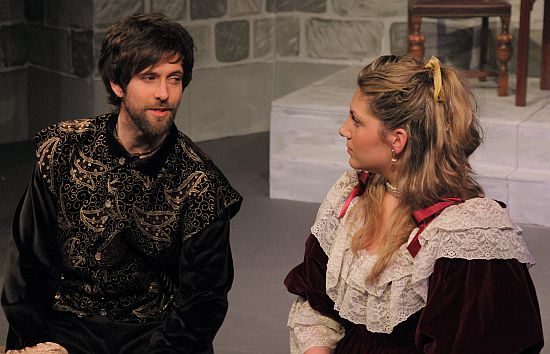 |
|
In Ward’s hands the focus is very much on the playful yet moral appeal of the dramatic situation. It is the St. Christopher drama that sets things in motion and one captures the whole complexity and power of theatre in all that follows. This can be seen, for example, in my favourite moment when the sinister Proctor threatens with his dagger the priestly disguise of Christopher Simpson, played by Ward, demanding that he proves he is simply a player. There is high tension as he turns to the only speech possible: ‘Is this a dagger which I see …’ but is then silenced by genuine fear. |
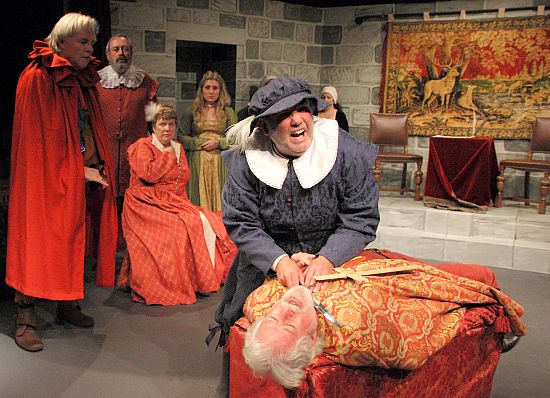 |
|
Throughout, the verbal play on who is the playwright – Shakespeare or Simpson – is clever and supremely witty, right up to the final scene with the exit of Proctor and his address to Lord Chief Justice Shaftesbury. This climactic scene is brilliantly staged by placing the audience as part of the public gallery so that we become judge and jury ourselves, within the drama of the Court’s decision and thus subject to the Judge and, as he is also admirably played by Ward, to the actual playwright himself, who near the end slyly states: ‘Well … that went rather well’! |
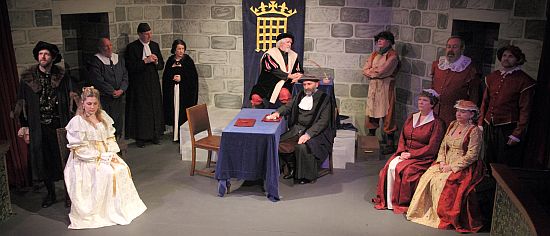 |
|
It is to Ward’s credit that we recognise the language and drama of Shakespeare, but he has made this work very much his own. He never lets us forget that, whilst he has written an exploration of a local event with wider resonance, Gouthwaite Hall is essentially about the power of dramatic narrative and its realisation through the language and performance of theatre. Though belonging fittingly in the Pateley Playhouse it deserves to be studied, seen and heard much farther afield.
Joanna Moody [Dr Joanna Moody is an authority on Elizabethan England, and has authored several books, most notably The Private Life of an Elizabethan Lady: The Diary of Lady Margaret Hoby, who was a contemporary of the Yorkes, Ingilbys, Simpsons, Proctors and Cholmoleys who feature in Gouthwaite Hall]
[This review appeared in the Pateley Bridge & Nidderdale Herald on Friday 28 October 2011]
Photographs by Chris Iredale
|
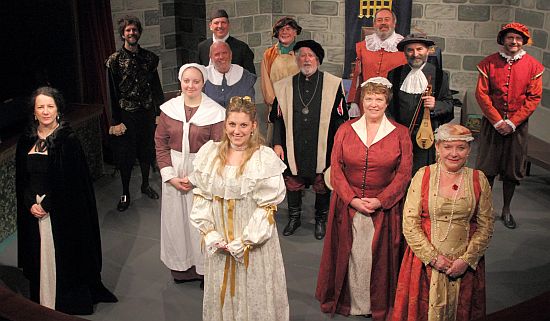 |
Feedback for Gouthwaite Hall 2011
Congratulations to you all on a splendid production
An amateur company? - there wasn't anything remotely amateur about that performance!
Very well researched, with great attention to detail in plot and characterisation
Great Music!
We thought it was superb - our first visit to the Playhouse and we'll definitely be back
The script was brought to life with all your company's clarity and versatility
How much we enjoyed the play! - there is so much in it: plots, humour, historical context and a real feel for the characters and what drives them
What a wonderful venue - so warm, friendly, intimate and welcoming
How well you use that tricky and intimate space!
It's always a joy to see familiar faces tackling contrasting roles with relish and confidence - a PBDS trademark!
A thoroughly enjoyable, excellent performance
The Shakespearian connection was cleverly done
The players held my attention throughout - the acting was excellent
The excellently performed music added a big emotional thrust to the play
It was hard to believe this was an amateur production - the professional nature of the performance extended to costumes, scenery & props
Excellent acting and a superb script
Please pass on our thanks to all involved, including stage hands, volunteers on duty Front of House and at the bar - collectively, they made what I hoped would be a good evening into a really wonderful event
I've always valued innovation, risk taking and loads of collective creative energy......PBDS have it - and how!